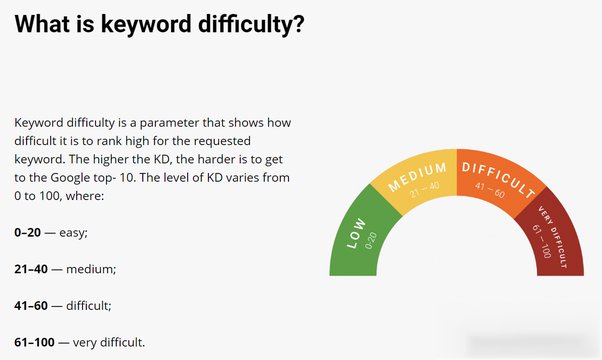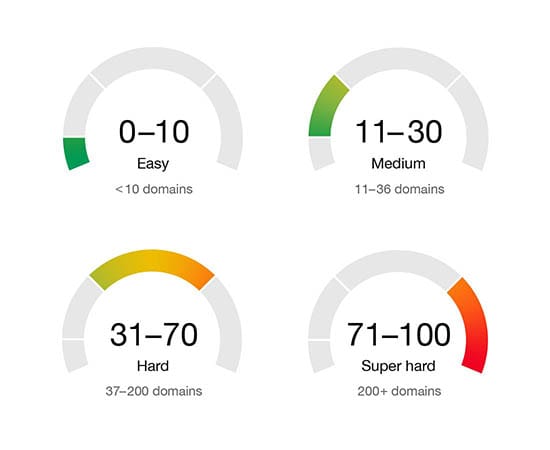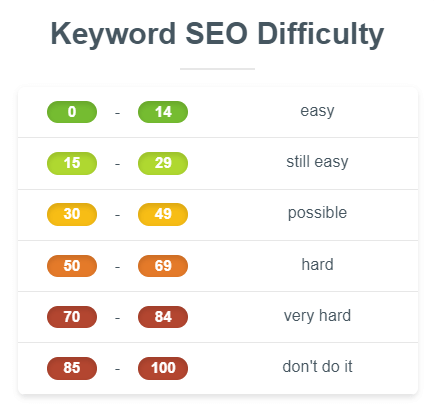A successful SEO campaign starts with keyword research. Marketers must know which keywords to optimize and which to target in order to rank at the top of search results. It’s crucial to note, however, that some keywords or phrases are more difficult to rank for than others. The keyword difficulty score comes into play in this case. In this guide, we’ll look at what keyword difficulty is and how to calculate it in order to boost your search engine ranking.
Page Contents:
What is Keyword Difficulty?
Keyword difficulty is a metric that indicates how difficult it is to rank for a specific keyword. It essentially determines how competitive the keywords are. It rises as competition rises, making it more difficult to rank for certain keywords. You can use keyword difficulty to determine whether or not to optimize for a particular keyword. It does not include any of the on-page SEO factors.
Why is Keyword Difficulty important?
Keyword difficulty is an important part of the keyword research process because it aids in the selection of best keywords for SEO. It should be a part of any keyword research process because it provides information on the most popular sites in your industry.
It also helps in the identification of alternative keywords with a high likelihood of appearing in search results. Furthermore, it helps you target the right keywords even if your business is newly established.
Some of the major advantages of analysing keyword difficulty:
- Helps improve rankings on SERPs: If your goal is to rank on the top of the search results, then keyword difficulty should be an essential part of your SEO strategy.
- Provides clarity on specific keywords competition: It examines different factors like competitor sites strength, domain authority, search intent and provides clarity on choosing the right keywords for your business niche.
- Useful for new businesses and start-ups: Keyword difficult is especially helpful for new businesses and start-ups as it helps you select the right keywords and increase your chances of ranking among other big players in the industry.
Keyword Difficulty scale
It is a metric that help you assess keyword difficulty level. Keyword difficulty scale ranges from 0 to 100. The higher the score, more difficult is to rank on the Google search results.
Keyword difficulty score above 70%
These are high difficulty keywords with very high competition. You will need to spend lot of time and money to be able to target these keywords. It does not guarantee immediate results and requires an extensive SEO planning and link building.
Keyword difficulty score between 30% and 70%
Targeting these keywords is comparatively much easier than the previous one. These keywords have moderate competition and high search volume that makes it easy to rank and appear on top positions in SERPs.
Keyword difficulty score below 30%
These are low difficulty keywords and are easiest to rank on search results. However, these keywords generally don’t have enough search volume. If you want to rank for these keywords, try to opt for low-difficulty keywords with decent search volume that are suitable for your business niche.
Avoid choosing high-competitive keywords as it is challenging to rank for them. Similarly, do not opt for extremely low-competitive keywords as they don’t have enough search volume. Try to choose moderate competitive keywords with high search volume.
Factors affecting Keyword Difficulty
Competitors: Keyword difficulty also relies on competitor websites. For instance, if your newly launched website is targeting the same keywords as an established business site, it will be challenging to rank for those similar terms.
Content quality: Google prioritizes content that conveys valuable and useful information to the readers. Hence, ensure that your content adds value and is relevant to the user’s search intent. Quality content not only includes exceptional writing but also involves data points, content relevancy, inclusion of multimedia and reputable links.
Backlinks: Each website ranking on SERP is given a score according to the quality and quantity of backlinks. Backlinks is an important ranking factor as it provides estimate of how hard it is to rank for a specific keyword. Pages with high-quality backlinks rank well on the SERPs.
Search intent: It is important to understand why your target audience is searching for a particular keyword. Make sure to also focus on the action you want the searcher to take further.
Domain Authority: The ability of your site to rank on top of the search results is also determined by its domain authority. It depicts your website reputation in terms of how valuable and useful its content is for the audience and the industry. The higher the domain authority, the higher are the chances of increased website’s reputation and credibility.
How to calculate Keyword Difficulty?
Keyword difficulty is measured through a website’s link profile. The calculation is based on several factors including
- Domain Authority
- Page Authority
- Citation Flow
- Trust Flow
Then, an average score is obtained that evaluates how hard it is for a website to rank on top of SERP for that specific keyword.
Two important aspects to consider before using keyword difficulty are keyword popularity and relevance. If the keyword difficulty is low but has very less search volume, it will hard to garner traffic.
Similarly, if the keyword difficulty is low but the content is not relevant, you will not rank for that keyword as search intent does not match with the content type. Some of the keyword difficulty measuring tools are Moz, Majestic, Ahrefs, etc. As scores may vary from tool to tool, it is important to compare values with one tool for accurate results.
Keyword difficulty is a fundamental component of a keyword research process. Keyword difficulty score helps you analyze keyword lists and select the best keywords suitable for your business. You can use it to find high-volume high-intent keywords that are less difficult to rank for than other keywords.
It helps you evaluate how easy or difficult it is to rank for keywords enabling you to choose the right keywords. It saves massive amount of time and effort helping you create content that has the potential to generate traffic and high click-through rate.


